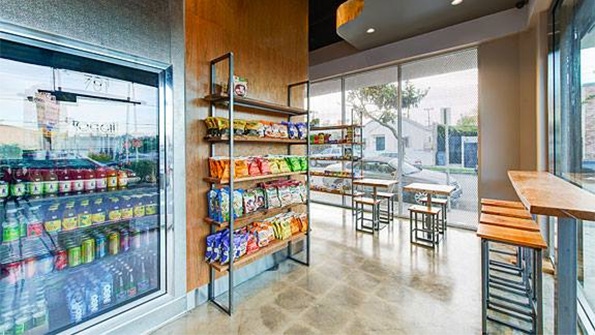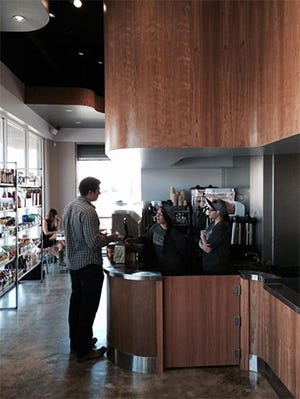
 Melissa Rosen and Greg Horos set out to change the health food store model when they opened Locali Conscious Convenience five years ago in Southern California. But they didn’t expect the food service component to grow as it has. Now the company identifies more as a fast-casual restaurant than small (even micro), convenient health food store. With the opening of their third store, the partners believe they have a model for the future and plan to franchise soon. Natural Foods Merchandiser spoke with Rosen about the importance of convenience and how Locali has grown around the grab-and-go experience.
Melissa Rosen and Greg Horos set out to change the health food store model when they opened Locali Conscious Convenience five years ago in Southern California. But they didn’t expect the food service component to grow as it has. Now the company identifies more as a fast-casual restaurant than small (even micro), convenient health food store. With the opening of their third store, the partners believe they have a model for the future and plan to franchise soon. Natural Foods Merchandiser spoke with Rosen about the importance of convenience and how Locali has grown around the grab-and-go experience.
Natural Foods Merchandiser: How did Locali Conscious Convenience come to be?
Melissa Rosen: Once we had the idea, we opened in six months. We always envisioned a convenient and healthy eco-market-deli hybrid with grocery retail and an organic deli, kind of a throwback to White Hen Pantries and Wawas, those convenience stores that had grab-and-go items and a deli where a customer could get a sandwich or a little salad. Our salads and sandwiches were just a hit, so we came up with more and more and more and now we do a pretty extensive menu for our small size. Items include about 12 paninis and cold sandwiches, five breakfast sandwiches, 10 smoothies, hemp milkshakes, vegan soft-serve, seven salads and quinoa bowls among vegan versions of traditional convenience store foods such as nachos (vegan, of course).
NFM: Are you a convenience store, natural foods store or fast-casual restaurant?
MR: A fast-casual restaurant fits best because, ultimately, 75 percent to 80 percent of revenue comes from the deli and it’s really our showpiece. We have an extremely unique menu. You can’t find our flavor profiles anywhere. I think that the grocery retail aspect is a way that we can influence the marketplace and support brands that we believe in. But the revenue generator is the deli side.
NFM: How much is made-to-order vs. grab-and-go in the cooler?
MR: Right now everything is made to order, but we are looking to expand this summer into cooler and packaged sales with a vegan line we’ll sell into other groceries and small-format stores.
NFM: Why is convenience so important to your brand?
MR: Our customers are very much in and out; there are people who linger and stay for an hour and a half and meet with a group of friends to have lunch, but 70 percent grab on the run. That’s not going to change; our lifestyles are harried and we’re not going to turn back time and get away from this need for convenience.
Even if customers sit in, they call ahead or use our app [created in partnership with ChowNow] or another mobile ordering platform like GrubHub. On the retail side, we hear customers choose us rather than drive to Whole Foods Market because they know they can get in and out without adding another ‘$70 more to my cart by the time I walk out.’ We feel like we serve as a bridge between a consumer’s weekly or biweekly grocery trip.
NFM: With space such a premium in stores from 450 to 1,200 square feet, how do you curate your product selection?
MR: We carry things we’ve noticed have traction. For our customers, that’s vegan and gluten free. In terms of our pantry staples, grab-and-go and health and beauty, we stick to that even though we also have turkey, chicken and tuna fish on the menu in Hollywood and downtown L.A. In our freezer, we might have Applegate chicken nuggets, for example, as they have been in demand. We also select products that have that convenience store, fun foods aspect. For instance, we’re not going to stock Artisana’s bigger jars because shoppers are going to buy the grab-and-go packets. Taste, of course, is also important for us. We choose the tastiest things in the marketplace and try to get past the hype to stock products that have integrity behind their story. That’s one of the advantages of Natural Products Expo West, seeing that the people operating the company are walking the walk.
NFM: How is merchandising different compared with larger stores?
MR: We are like a little boutique clothing store in the way we showcase our product. We don’t have shelving in the middle of our spaces, it’s usually on the walls, so shoppers are not walking around merchandise. Customers often order their sandwich and then spend time browsing, looking at the different products, and they usually pick up three or four things. Our average ticket price is higher than the typical quick-service restaurant because in addition to their drink and sandwich they also buy something like a gluten-free pasta to make that night for dinner, drinks for later in the day or a bottle of wine to take home. NFM: You have the benefit of being in trendy locales. Are your customers all early adopters or are you targeting the crossover consumer?
NFM: You have the benefit of being in trendy locales. Are your customers all early adopters or are you targeting the crossover consumer?
MR: Our customer base crosses the spectrum, in terms of socio-economics and ages, especially now that we are getting a lot of older customers. We knew we would unite all of our customers because of a concern for what they eat, how it affects their health and how their choices impact the planet. In terms of brand loyalty and being an early adopter, the people that shop us are very progressive and when they find a product they believe the social mission of or of course, more important, like the taste of, they are great brand ambassadors and run around telling their friends, ‘You gotta go to Locali, they have this new tea or they have this new chip.’
NFM: Why franchise?
MR: We’re proud to be a part of this healthy fast-food movement. We believe this is a disruptive retail experience that is making little ripples of social change and we’ve seen it happen in Hollywood and we’re seeing it happen downtown and in Venice. It’s a model I feel someone can come in and be able to have a career and raise a family and that’s why we want to franchise. This is an opportunity like a Subway; it’s a small volume of staff, it’s a more intimate retail and restaurant experience and it’s something in which someone with limited food service experience could buy a franchise and be able to own, operate and be trained within three months.
About the Author(s)
You May Also Like
.png?width=700&auto=webp&quality=80&disable=upscale)




